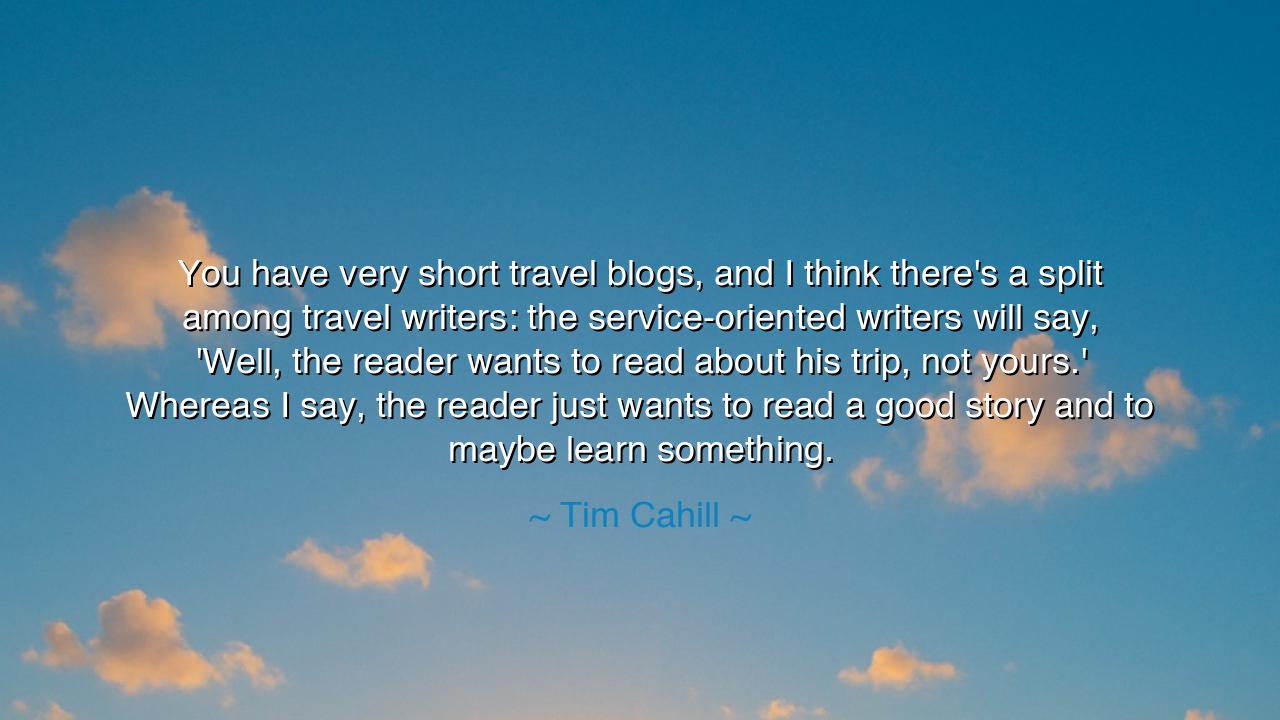
You have very short travel blogs, and I think there's a split
You have very short travel blogs, and I think there's a split among travel writers: the service-oriented writers will say, 'Well, the reader wants to read about his trip, not yours.' Whereas I say, the reader just wants to read a good story and to maybe learn something.






Tim Cahill, a pioneer of modern travel writing, once spoke with clarity about the soul of storytelling: “You have very short travel blogs, and I think there’s a split among travel writers: the service-oriented writers will say, ‘Well, the reader wants to read about his trip, not yours.’ Whereas I say, the reader just wants to read a good story and to maybe learn something.” In this remark lies a profound truth about the art of communication: that beyond maps and itineraries, beyond lists of hotels and monuments, what endures in the human heart is the power of a story—alive, personal, and filled with meaning.
Cahill observes a split among travel writers. Some, he says, believe their task is to serve the reader as guidebooks do: providing facts, recommendations, and directions, focusing always on the reader’s imagined journey rather than their own lived one. This is the service-oriented writer, whose purpose is utility. And indeed, there is value here—such guidance has its place, for travelers often seek practical knowledge. Yet, as Cahill reminds us, this is not the whole truth. For the heart of writing, the ancient fire around which men and women have gathered for millennia, is not lists, but stories.
When he says, “the reader just wants to read a good story and to maybe learn something,” he calls us back to the primal purpose of words. Humanity has always hungered for tales of others: of Odysseus wandering far from Ithaca, of Ibn Battuta crossing deserts, of Marco Polo discovering strange courts and markets. The listener does not tire of these journeys because they are not their own—indeed, that is precisely why they fascinate. In another’s tale, we find not only entertainment but the chance to reflect, to learn, to glimpse truths about the world and ourselves.
History itself illustrates this. Consider Herodotus, called the Father of History. His writings did not simply list routes or describe lands; they overflowed with stories of kings, wars, customs, and marvels. Readers did not seek in him a manual for their own travels, but a window into worlds beyond their reach. Or think of Marco Polo, whose accounts of Asia became one of the most celebrated travel narratives in the West. His readers did not wish to trace his exact footsteps—they sought wonder, perspective, and knowledge. In these tales, truth became woven with imagination, yet the lessons endured.
Cahill’s words remind us that storytelling transforms travel into wisdom. A journey is not simply the movement of the body through lands but the transformation of the spirit through experience. To write only for service risks missing the deeper treasures—the moments of awe, the encounters with strangers, the revelations of culture and self. The reader, though not walking beside the writer, joins the journey in spirit, living the path vicariously, and in doing so, perhaps learns something vital about the human condition.
The lesson for us is clear: whether in writing or in speaking, do not reduce your words to mere instructions. Strive to tell a good story. Tell of your own path, not in vanity, but in honesty, weaving the personal with the universal. Share your failures as well as your triumphs, your confusion as well as your joy, for these are what make a tale human. The reader does not demand perfection—they crave truth, vitality, and meaning.
Practically, this means that when you recount your journeys—whether across seas, through cities, or in the quieter landscapes of the heart—seek not only to inform but to inspire. Offer details, yes, but also offer your wonder, your struggles, your laughter, your lessons. For in this way, your words will become more than guidance—they will become companions to others, nourishing them as they chart their own paths.
So, O listener, heed Tim Cahill’s wisdom: in the end, the world does not hunger for cold instructions, but for stories that breathe. Write your tale, speak your truth, and let it shine with the humanity of lived experience. In so doing, you may not only entertain, but kindle in another the flame of curiosity, courage, and wisdom. And that, above all, is the true journey of the storyteller.






AAdministratorAdministrator
Welcome, honored guests. Please leave a comment, we will respond soon